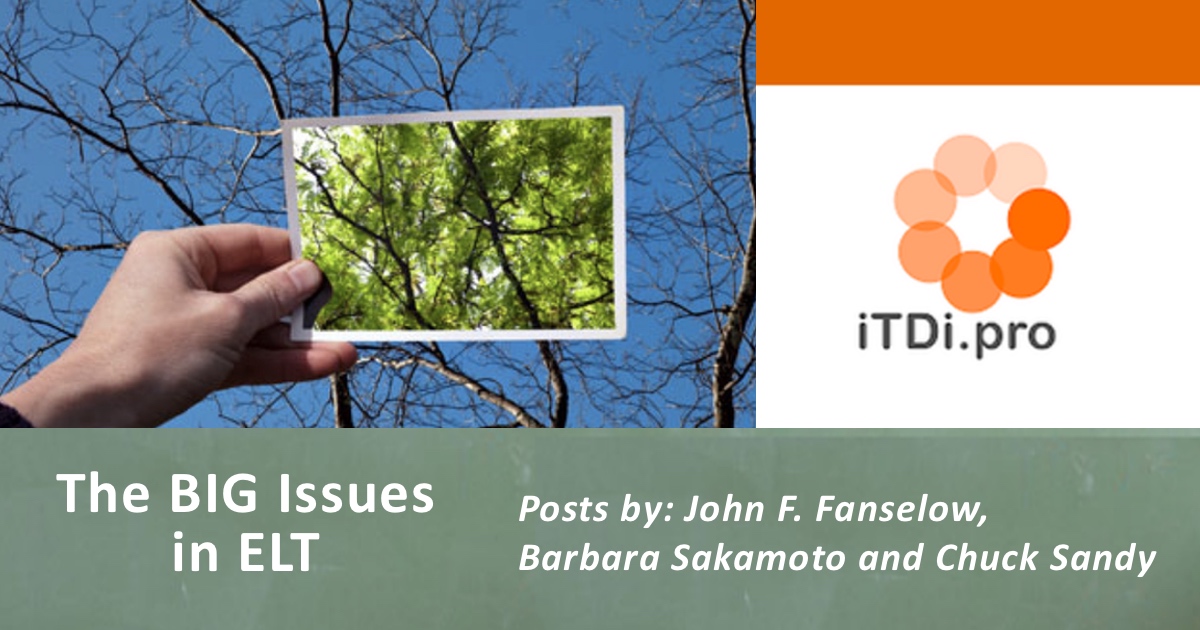
Living as I do in a quiet corner of central Japan where not much happens, I might be the last person you’d expect to see commenting on recent trends in ELT. Then add to this the very fact that it’s been a good while now since I’ve been a classroom teacher and it’s almost like I should disqualify myself from this task. Still I do keep a social media lookout for news from the English language teaching world and further fuel my addiction to this news with daily readings from the many English Language Teaching (and education) blogs that I follow and stumble upon. It’s from this distant vantage point that I offer up the following notes and observations.
- It’s been a year in which ELT teacher equity has been brought to the forefront thanks to the IATEFL 2016 plenary by Silvana Richardson, the ongoing work of TEFL Equity Advocates, and the conversation which has been happening all over social media for much of the year. The fact that the profession is now beginning to move away from the native-speaker bias that’s plagued ELT for years is something worth applauding.
- There’s been a vigorous discussion about what it means to be an ELT teacher going on throughout the year. While at times related to the equity issues raised above, this discussion has also seen many questioning what it takes to begin work as a qualified English language teacher. For an overview of this discussion, you might start with this post on Hugh Dellar’s Lexical Lab blog. But don’t stop there. For a full range of the discussion and the bigger picture of the problem, do a search for TEFL or TESOL or EFL teacher qualifications and spend some time looking around. As you do, consider for yourself what it means to be an ELT professional and what sort of qualifications new English language teachers should have upon entering the field. This is a discussion we’ll be seeing more of in the coming year.
- Several groups around the ELT world have begun experimenting with the notion of what a conference is and exploring the ways that ideas and initiatives can be shared. Who should be invited to speak? How long should keynote presentations be? Should there even be keynotes? Do we even need a traditional venue? What would happen if the doors were widened enough to bring in ideas from education, psychology, and business? Although there are several groups and individuals I could mention, Innovate ELT, ExcitELT, and EdYOUfest come to mind. Then there’s Laura Patsko and her Pedagogy Pop Ups on Periscope. It will be interesting to see how these start-up conferences and idea-sharing platforms develop in the coming year. Maybe you’ll be participating in one or more of these or forging ahead with new initiatives of your own.
- Everyone has probably noticed the slow but steady rise of the indie ELT publisher over the past couple of years. It may have all started with The Round but now there’s Atama-ii with its “choose your own adventure” books, Wayzgoose Press with a growing list of titles, and the soon to be launched The ELT Workshop. There is also a growing series of collaboratively written books produced by Heart ELT which are beautifully done. These are well worth a look.
- It seems that teacherpreneur just might be the ELT word of 2016. Though I first became aware of the word some time ago while exploring the archives at the mostly K-12 Teachers Pay Teachers, it didn’t register fully until I connected with Patrice Palmer. Her website is full of interviews with teachers who have made the jump from classroom teacher to provider of hand-crafted materials, self-published books, and online lessons. If you find this intriguing and are considering making a similar jump yourself, Patrice will be leading an iTDi Advanced Course in January 2017 called Teacher To Teacherpreneur that will help you explore your options as you learn about the business end of ELT.
- Perhaps it’s because I live way out in the middle of nowhere as I do that I’ve been even more amazed this year by how easy it is to collaborate on projects with people in far-away places. The things I’m working on now couldn’t have been done even a few years ago. The tools which are now available to us have become that easy to use. I can hardly imagine what’s next.
- I’m going to go out on a limb here and call 2016 the beginning of a post-PLN (Personal Learning Network) world. What I see from where I sit is more people getting connected in more ways and yet collaborating more closely in smaller groups. My friend Michael Obrien calls these smaller groups pelotons – a word that comes from the cycling world. A peloton is a group of cyclists who work collaboratively towards the fulfillment of a common goal. Sometimes one rider takes the lead while others block the wind. Sometimes another one does. Sometimes one rider will pull ahead while others fall behind. Then that one waits for others to catch up. “You can never be faster than your peloton,” says Michael. Nor should you. You’re all getting to the same place together and because you’re getting there together, that makes the whole experience better. Working in this way with my peloton is my goal for 2017.
And perhaps our paths will cross as I read your posts, or as we work on online projects together, or maybe we’ll even meet up out in the physical world somewhere. Although I write to you from a distant outpost, the ELT world is a small one. To where ever you are and for whatever you do, I thank you and wish you a happy, healthy, and prosperous year ahead.


